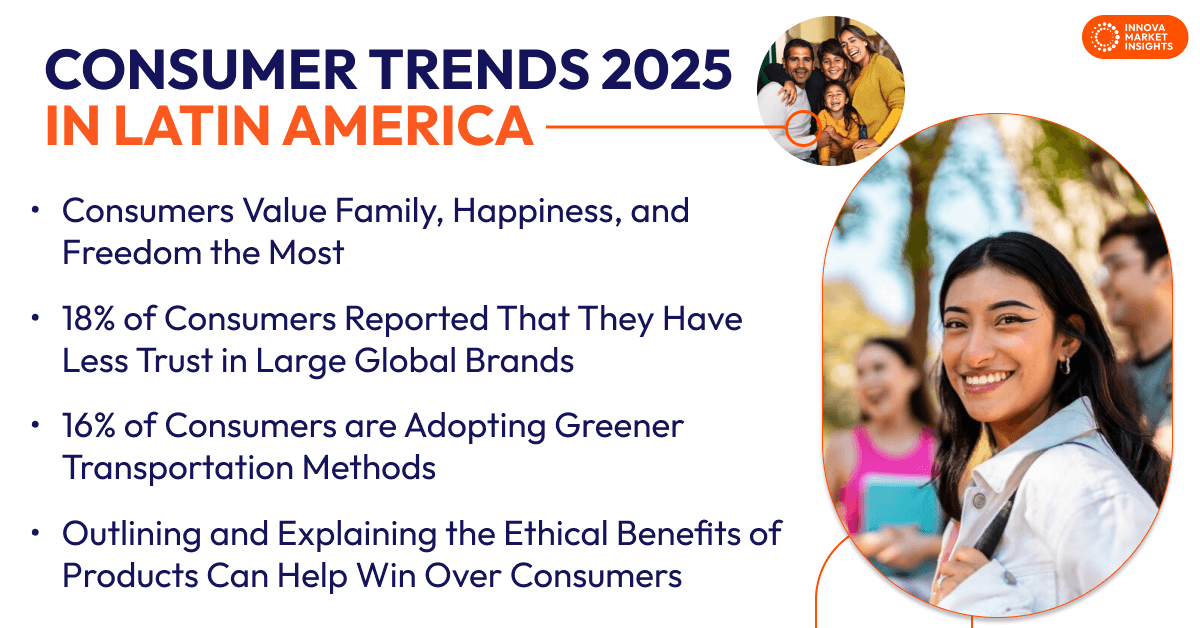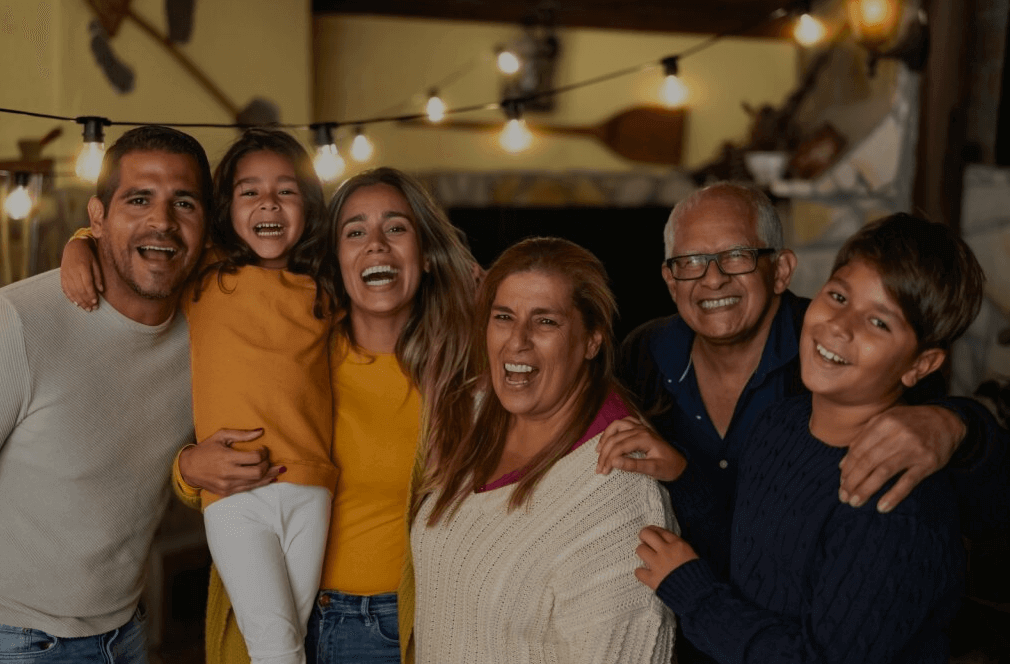November 25, 2025 – Consumer lifestyles are changing constantly, and for citizens across the continent of Latin America, certain economic and social shifts are happening. To understand these trends in more depth and analyze where they may lead, Innova Market Insights has compiled this report offering essential insights, macro context, and opportunities for brands to take note of.
What Are Latin American Consumers Most Concerned About?
Consumers in Latin America are mostly concerned about the health of the planet. Climate change and its effects are at the forefront of many people’s minds, mostly focusing on the issues of health, food security, and the economy. Corruption is also a worry for many in the region, with personal security and privacy coming in close behind at fourth place. Generational differences in attitudes toward global issues have revolved around uncertainty. For 18-24 year olds, matters about terrorism, the economy, or job availability are more of a concern than they are for older generations.
Innovation is developing, and with it so are the ways people live in the region. Advances in gene therapy are providing cutting-edge healthcare treatments; precision fermentation is creating more sustainable alternatives to traditional protein sources. Elsewhere, artificial intelligence is improving productivity and enabling personalization but is also disrupting job markets. Augmented and virtual reality continue to become more realistic and easier to use, enabling consumers to try out products, or offering more engaging experiences.
What Are Consumer Lifestyles Like in Latin America?
Consumers value family, happiness, and freedom the most. Three in five consumers on the continent consider family to be an important personal value. Consumer trends in Latin America show that freedom and wellbeing are top values for over a third of those studied by Innova Market Insights. Declining consumer trust is a key driver of attitudes, with 55% of those in Latin America saying they have less trust in the government, while around 24% have less confidence in large or global brands and companies. The top reasons consumers have less trust in large or global brands, and companies are largely down to claims of greenwashing, the sentiment that they prefer profits over consumer benefits, and health claims.
Do Latin American Consumers Feel in Control?
Factors driving declining trust vary by country, for example, greenwashing is the top factor in Mexico, which implies that there is considerable skepticism toward companies that make sustainability claims. Ethical reasons in the form of companies putting profits before consumer benefits are the top factor in Brazil, which aligns with wealth and income inequality being a global issue of concern.
Consumers are taking more control of their lives than ever before, with 43% of consumers in Latin America saying they feel they have greater control in their lives. Being more self-sufficient is the top reason, with a net positive of 18% in consumers feeling more in control of their lives. Other contributing factors include improvements in personal finances and easier access to information.

How Important Is Product Quality and Integrity in the Region?
A significant 18% of consumers in Latin America reported that they have less trust in large global brands and companies due to product quality, which is also the number one concern for consumers buying food and beverages. For 33% of those researched by Innova Market Insights, good or premium quality is key to perceiving a product as good value for money, right behind being nutritionally beneficial or healthy. Consumer trends in Latin America show that 26% of consumers say environmentally or planet-friendly products offer good value.
Are Latin American Consumers Leading Healthier Lives?
Health and wellbeing have emerged as the leading preference for Latin American consumers beyond living essentials, with 48% classifying it a top spending priority. In Brazil and Mexico, buyers rank it as the top choice. Nearly half of those consulted in the region have taken significant action toward healthier living in the past year. This comes as 35% consider wellbeing among their most important personal values, coming third just behind family and freedom as the top two key values. Mental and emotional wellness leads as the primary health goal across all age groups and countries, followed by vitality and energy. Interestingly, the standout statistic in this section of the report showed that 81% of consumers in Mexico are interested in wellness and stress relief through bath and shower routines.
This focus on health has driven consumers to adopt a more self-care approach to health, with 54% of consumers in Latin America saying they have become more self-sufficient in the care of their own health over the past three years. Adequate sleep, personal hygiene, exercise, healthy diet, and emotional health care rank as top self-care priorities. When it comes to eating habits, 35% of consumers prioritize high nutritional value in products, while 28% actively choose food or beverages that boost their health.
Do These Factors Give Rise to Conscious Living in Latin America?
In Latin America, there are increasing concerns over the health of the planet, giving rise to conscious living habits. Regional differences reveal distinct priorities, as Mexican consumers demonstrate greater concern about the environmental impact of travelling. For 29% of those researched, reducing car usage and choosing greener transport options was preferable in Mexico, compared to just 15% for their Brazilian counterparts. Consumer trends indicate that nature protection is the top action consumers expect from companies in Mexico, while sustainable packaging is number one in Brazil.
Heightened environmental awareness is translating into greater self-sufficiency through practical actions. Innova Market Insights found that 16% of consumers are adopting greener transportation methods like walking and cycling, while 17% are growing their own produce. Despite the 11% result, the report also found that many Latin Americans have started composting food waste. This is largely down to the growing awareness of initiatives such as minimizing food waste and recycling or upcycling, which are the most common conscious living practices.
Are Changing Occasions Shaping Habits in Latin America?
Socializing is becoming more home and nature-focused for consumers in Latin America. There is strong net growth in the importance of the home as a place to socialize, while outdoor spaces such as the countryside, parks, and gardens are also seeing strong growth. Bars and clubs are becoming less meaningful places to socialize. Family, sharing food together, and time with their children are the top sources of social connection for many, with shared interests and experiences also proving significant. Special food to consume at home and social gatherings with family and friends are essential spending priorities beyond living essentials, with in-home entertainment a more important priority in Brazil than in Mexico.
Mexico shows a noticeable shift toward dining at home, with a net increase of 50% compared to Brazil’s 46%. This consumer trend reflects multiple motivations such as cost savings, convenience, quality control, and a preference for home-cooked meals. Despite this shift, restaurants, workplaces, and coffee shops maintain their charm. Restaurants have gained particular importance among 25-44 year-olds, while workplaces and coffee shops have become increasingly influential dining destinations for 18-34 year-olds.
Moments of happiness and indulging in small treats are favored over larger planned experiences or events when it comes to rewards for consumers. In Brazil, the primary aspect of a happy moment is relaxation, whereas in Mexico, it is sharing time with family. More than two in five consumers in Latin America plan to treat and reward themselves with travel or holidays more in the next 12 months, while over a third of them plan to do it by buying clothes, shoes, and accessories. Drivers of choice in everyday treats vary by country, with health and savory being the top attributes in Brazil, while sweet and calming are the top attributes in Mexico. Freshness and flavor drive enjoyment in food for both countries, with nutritional benefits a more important driver in Brazil, while good value for money comes through stronger in Mexico
What Is Trending With Latin American Consumers?
Consumers who are digitally empowered can be increasingly willing to serve and support themselves on aspects of life such as health, finance, fitness, and cooking at home. With that said, consumer trust is declining as the expectations of greater honesty and transparency form. Largely attributed to the lack of reassurances from brands. Trends of natural and more authentic experiences are sought after, all in pursuit of a healthier and cleaner lifestyle. With feeling well the key driver for pursuing a healthier lifestyle, consumers are adopting strategies to help them look and feel their mental and emotional best.
How Do Countries in Latin America Compare?
Consumer trends in Latin America show that mental and emotional wellness or vitality and energy are the top two primary health goals for consumers in both Brazil and Mexico. When it comes to improving mental and emotional wellbeing, physical exercise and getting more sleep are the top two actions in both countries.
Diet and nutrition changes rank higher in Mexico than in Brazil, while leisure activities to calm or de-stress rank higher in Brazil than in Mexico. Regarding healthy aging, maintaining an active mind ranks second in importance for both nations, though Brazilians prioritize a positive mindset slightly higher than Mexicans.
What’s Next in Consumer Trends for Latin America?
Consumer trends that can or are likely to take hold in the continent of Latin America will vary. Companies want to regain trust and confidence of the population need to give them easy ways to manage things they would like to be more in control of like health, fitness, finance, and cooking. This should be done while acknowledging differences across age groups and living situations. Other opportunities exist for brands to convey the honesty of product quality through clear conversations. In many cases, outlining and explaining the ethical benefits of choosing their products can help win over consumers. Strategies that work on the balance of feeling emotionally and mentally well can be part of this. In some cases, helping consumers feel grounded can convey the sentiment of being connected with natural moments in the outdoors through the branding and messaging used.
This article is based on Innova’s Consumer Trends: Opportunities for 2025 – Latin America Edition report. This report is available to purchase or with an Innova Reports subscription. Reach out to find out more.
